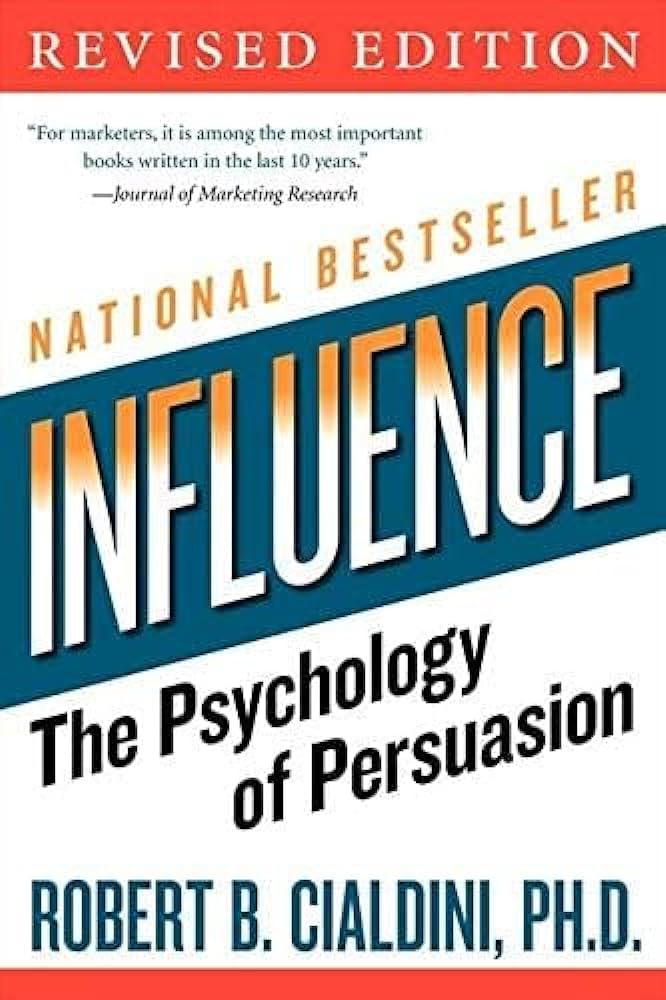Influence provides an in-depth account of how people are persuaded and is a must-read for anyone working or interested in sales or marketing. Using seven fundamental psychological principles (reciprocation, liking, social proof, authority, scarcity, commitment/consistency, and unity), Robert shows us how to effectuate near automatic compliance with a given request. The findings are as insightful as they are surprising: most of us deny that others have influence over our actions, yet the research convincingly points to the contrary. Importantly, awareness of these tactics can also help build our defenses against undesirable requests. This book has given me a foundation for how to convince others of my ideas, and has shown me how I’m being influenced by others.
You should read this book if you…
- want to improve your ability to influence
- are interested in how situational factors impact behavior
- seek more control against outside influences
Favorite Quote
“It’s a fool’s errand to try to overcome faith-based, emotionally held beliefs with logical argumentation, as each represents a separate way of knowing“
Additional Information
Year Published: 1984
Book Ranking (from 1-10): 9 – Excellent – Broad and very well articulated insights
Ease of Read (from 1-5): 4 – Moderately challenging
Key Highlights
- We can’t be expected to recognize and analyze all the aspects of each person, event, and situation we encounter in even one day. We haven’t the time, energy, or capacity for it. Instead, we must often use our stereotypes, our rules of thumb, to classify things according to a few key features and then respond without thinking when one or another of the trigger features is present
- Because there is a general distaste for those who take and make no effort to give in return, we will often go to great lengths to avoid being considered a freeloader. It is to those lengths that we will often be taken and, in the process, be “taken” by individuals who stand to gain from our indebtedness
- One way to increase the chances I will comply is first to make a larger request of me, one that I will most likely turn down. Then, after I have refused, you make the smaller request that you were really interested in all along. Provided that you structured your requests skillfully, I should view your second request as a concession to me and should feel inclined to respond with a concession of my own—compliance with your second request
- It’s a fool’s errand to try to overcome faith-based, emotionally held beliefs with logical argumentation, as each represents a separate way of knowing
- “Repeat a lie often enough and it becomes the truth.” Particularly unsettling are the related findings that even far-fetched claims—the kind of allegations favored by fake-news creators—become more believable with repetition
- In general, when we are unsure of ourselves, when the situation is unclear or ambiguous, when uncertainty reigns, we are most likely to accept the actions of others—because those actions reduce our uncertainty about what is correct behavior there
- It turns out a communicator can rapidly acquire perceived trustworthiness by employing a clever strategy. Rather than succumbing to the tendency to describe all the most favorable features of a case upfront and reserving mention of any drawbacks until the end of the presentation (or never), a communicator who references a weakness early on is seen as more honest. The advantage of this sequence is that, with perceived truthfulness already in place, when the major strengths of the case are then advanced, the audience is more likely to believe them. After all, they’ve been conveyed by a trustworthy source, one whose honesty has been established by a willingness to point at not just positive aspects but negative ones as well
- “All you have to do is agree to this proposal, and we will have a deal.” I thought I recognized the problem and suggested a minor wording change to, “We have a deal. All you have to do is agree to this proposal”
- Why should psychological reactance emerge at the age of two? There’s a crucial change most children undergo around this time. It is when they first come to see themselves as individuals. No longer do they view themselves as mere extensions of the social milieu but rather as identifiable, singular, and separate beings. This developing concept of autonomy brings with it the concept of freedom. An independent being is one with choices; a child with the newfound realization that he or she is such a being will want to explore the length and breadth of the options
- Instead, revolutionaries are more likely to be those who have been given at least some taste of a better life. When the economic and social improvements they have experienced and come to expect suddenly become less available, they desire them more than ever and often rise up violently to secure them
- Therein lies an important insight. The joy is not in the experiencing of a scarce commodity but in the possessing of it. It is important that we not confuse the two. Whenever we confront scarcity pressures surrounding some item, we must also confront the question of what it is we want from the item. If the answer is that we want the thing for the social, economic, or psychological benefits of possessing something rare, then, fine; scarcity pressures will give us a good indication of how much we should want to pay for it—the less available it is, the more valuable to us it will be. However, often we don’t want a thing for the pure sake of owning it. We want it, instead, for its utility value; we want to eat it or drink it or touch it or hear it or drive it or otherwise use it. In such cases, it is vital to remember that scarce things do not taste or feel or sound or ride or work any better because of their limited availability
- Once we make a choice or take a stand, we encounter personal and interpersonal pressures to think and behave consistently with that commitment. Moreover, those pressures will cause us to respond in ways that justify our decision
- “Persons who go through a great deal of trouble or pain to attain something tend to value it more highly than persons who attain the same thing with a minimum of effort”
- All this has important implications for rearing children. It suggests we should never heavily bribe or threaten our children to do the things we want them truly to believe in. Such pressures will probably produce temporary compliance with our wishes. However, if we want more than that, if we want our children to believe in the correctness of what they have done, if we want them to continue to perform the desired behavior when we are not present to apply those outside pressures, we must somehow arrange for them to accept inner responsibility for the actions we want them to take
- Companies struggle to get consumers to feel bonded with and therefore loyal to their brands; it’s a battle they’ve been winning by inviting current and prospective customers to co-create with them novel or updated products and services, most often by providing the company with information about desirable features. However, within such marketing partnerships, requested consumer input must be framed as advice to the company, not as opinions about or expectations for the company. The differential phrasing may seem minor, but it is critical to achieving the company’s unitization goal. Providing advice puts a person in a merging state of mind, which stimulates a linking of one’s own identity with another party’s. Providing an opinion or expectation, on the other hand, puts a person in an introspective state of mind, which involves focusing on oneself. These only slightly different forms of feedback—and the different merging versus separating mindsets they produce—can have a have a significant impact on consumer engagement with a brand

Discover more from The Broader Application
Subscribe to get the latest posts sent to your email.
